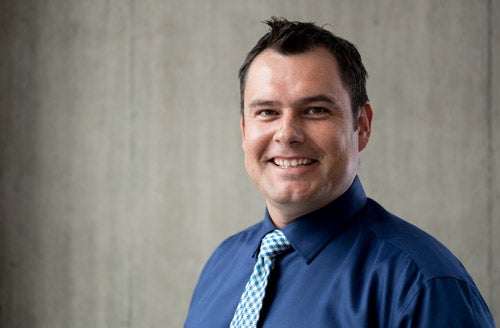How one man went from being homeless to winning Trudeau scholarship
Graduate history student Jesse Thistle has won a Trudeau Doctoral Scholarship for his research on Metis history
Graduate history student Jesse Thistle has won a Trudeau Doctoral Scholarship for his research on Metis history
By Megan Hood Faculty of ArtsWhen Jesse Thistle was battling addiction, he slept in shelters for homeless people, on friends’ couches and even the streets. At the time, he was angry at his parents for giving him up for adoption and confused about his aboriginal heritage.
After finally getting sober, Thistle went back to school, eventually making his way to the University of Waterloo to study history. Against all odds, Thistle, now a master’s student, has recently been awarded a prestigious Trudeau Doctoral Scholarship.

Graduate student Jesse Thistle has won a Trudeau Doctoral Scholarship for his research on Metis history.
Thistle is a descendant of road allowance Metis, an aboriginal community that lived alongside the road and railways in Saskatchewan after fighting and losing a battle against Canadian authorities in 1885. The Metis were dispossessed by the state and came to live on public strips of land known as road allowances.
Thistle, who lived there on and off until he was taken in by his paternal grandparents at three years old, is now a Canadian expert in the history of the road allowance Metis.
“I grew up without knowing my mother’s family history as ‘rebels’ who fought against Canada,” says Thistle. “By age 20 I was resentful of my heritage and my parents for giving me and my brother up. This led me to jail, the streets, and addiction until I got sober in 2008. In my quest to get sober I went back to school and tried to discover who I was as a Metis person.”
Thistle’s research in unresolved historic trauma of the Metis people investigates the dispossession of their land and sovereignty at the turn of the twentieth century, and how that trauma has manifested into contemporary social issues for the Metis and Cree descendants of Battle of Batoche veterans. His work debunks many myths surrounding First Nations and Metis, and shows how social dysfunction is not inherent in Indigenous communities or individuals, but rather a result of colonial history.
“I want people to better understand this chapter in Metis and Canadian prairie history - to make people see the resilience of my people.” Currently, no full historical monograph exists for road allowance history; Jesse is hoping that his thesis will be published and introduced as that first monograph. “It will be important for both Metis and Canadians so we can understand one another better, which may aid in the process of reconciliation. Knowing our history is especially important to our community as Elders are passing away and young Metis are searching for their identity.”
Thistle will begin his PhD studies at York University in September. He hopes to eventually gain a tenure track position at a Canadian university and continue his work and teaching in Indigenous prairie history in Canada. The Pierre Elliott Trudeau Foundation scholarship is awarded to outstanding doctoral candidates in social sciences and humanities programs who are doing research related to human rights and dignity, responsible citizenship, Canada in the world, and people and their natural environment. The award has an annual value of up to $60,000 for a maximum of three years.
Thistle’s thesis supervisor Waterloo Professor Susan Roy says: “As a member of a road allowance community, a Michif language learner, and with respectful community partnerships already in place, Jesse is well positioned to take on this highly original and innovative study.”
“A lot of academics work on Indigenous issues and community research but Susan works with and for Indigenous communities, and helps them recover their histories and lands,” says Thistle of Roy, a professor in Waterloo’s Department of History. “Her teaching style is arts driven and has made me a better writer and a more compassionate thinker, but mostly, it has brought me closer to Indigenous issues through experiential learning.”
“Jesse will certainly produce a work of profound and transformative significance to scholarship and to larger Indigenous-non-Indigenous relationships in Canada today,” says Roy.

Read more
Meet five exceptional Waterloo graduate students crossing the convocation stage as Class of 2025 valedictorians

Read more
Meet the 14 exceptional students representing Waterloo’s newest grads

Read more
Environment and Arts student, Eloise Fan, reflects on how studying her twin passions led not only to a BES, but also to academic distinction
The University of Waterloo acknowledges that much of our work takes place on the traditional territory of the Neutral, Anishinaabeg, and Haudenosaunee peoples. Our main campus is situated on the Haldimand Tract, the land granted to the Six Nations that includes six miles on each side of the Grand River. Our active work toward reconciliation takes place across our campuses through research, learning, teaching, and community building, and is co-ordinated within the Office of Indigenous Relations.